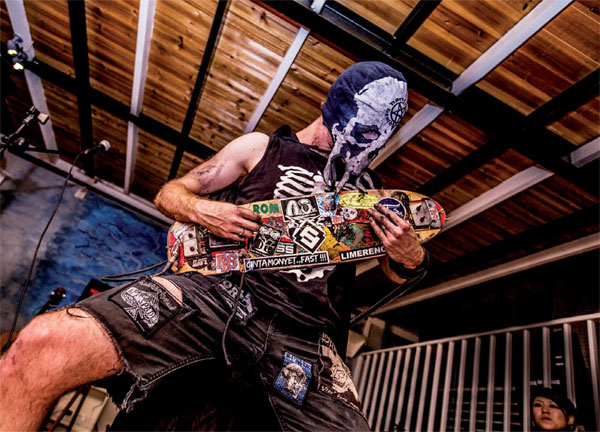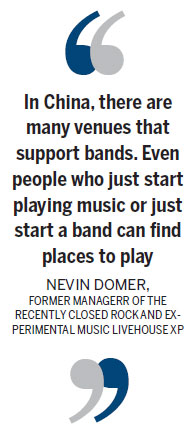The normal abnormal
Updated: 2015-07-31 08:30
By Yang Yang(China Daily Europe)
|
|||||||||||
|
Dann Gaymer of Guiguisuisui plays zombie music for an audience in Beijing. Provided to China Daily |
It may be that growing up in a cultural atmosphere that has lacked a rock music tradition, Chinese people are more readily receptive than others to rock music and the bands that play it. In addition, the lack of ground rules in the fledgling industry give it a distinctly free-and-easy, anarchic feel that seems to encourage artists to explore new types of music and to throw themselves into experimentation.
In recent years in China, as rock music has gradually seeped up from the underground into the mainstream, more young Chinese people have formed bands that are dynamic, fresh, talented and eager to express their thoughts and channel their energy in performances in front of ever bigger audiences in bars, at music festivals and even on national television, rather than limiting themselves to the echo chamber of rehearsal studios.
Into this scene have stepped part-time musicians from the West who have come to work in China. They feel particularly free to let their creative juices flow, having come from places that demand higher standards because the rock music industry there is much more sophisticated and demanding, which tends to inhibit them and limit their opportunities to play to audiences.
Liem, who has lived in Beijing for six years, recalls the days when rock music in China was a distinctly marginal, underground pursuit. Not only was it virtually absent from national television, but this music form seemed to be almost taboo, and many of the venues that ventured to stage rock music gigs did so shrouded in secrecy. Two cases in point are Mao Live and 2kolegas, two Beijing venues widely known to early Chinese rock aficionados, the former being little more than a metal box without windows, and the latter being, for most people, out of sight, out of mind and out of earshot.
"But last year I saw a punk band, Brain Failure, on CCTV," Liem says, "It was awesome. Things really are changing."
Josh Feola's take on the changes in rock music in China is slightly different. Feola, 28, a drummer in several bands and a freelance writer for music magazines and websites, says many young bands are now piggybacking on Chinese bands that have preceded them, imitating their style and throwing their own stylistic touches into the mix.
"It's good because five to 10 years ago a Chinese band would imitate a band from the West. Now they're imitating older Chinese bands. Sometimes it's no good if it's complete imitation. But it's good that there is a local example. I think that's healthy in the long run for the music scene."
On a rainy night in mid July, Black Hipster, a blues band, debuted at the Temple Bar. The lead singer is half Spanish and half American, the bass player comes from Australia, the drummer from Azerbaijan and the guitarist from England.
"Today is the day for new bands," said Pink Li, 28, Temple Bar's manager, wearing a camisole, a black punk-style necklace and hot pants.
"That's what we have set Wednesday aside for. After all, all bands, no matter how successful they eventually become, need to start somewhere, and we want to give them a chance to play in front of audiences."
The members of Black Hipster, well out of their 20s and 30s, have played in a lot of bands over the years, and their latest group is less than nine months old. They jumped at the chance to play at the Temple Bar, having played in many other venues, after coming across Li's contact details on the Internet.
"I listened to a demo and felt OK, so I agreed. Why not? We make money from drinks, not music. We don't charge bands to perform here. If they are good, they can come back. The Black Hipsters are good."
Dann Gaymer, 28, from Britain, and his girlfriend have formed a duo called Guiguisuisui (which means sneaky) that plays zombie music.
Today's Top News
Beijing makes it, again!
Probable MH 370 debris to be studied in Toulouse
Graft probe into Guo Boxiong to win army, public's support
SOE reform to open door to foreign capital
Effect of Chinese stock volatility on real economy limited
Chinese tea aims to go global on Belt and Road Initiative
Sino-Turkish links highlighted
Debris found off Africa linked with Flight MH370
Hot Topics
Lunar probe , China growth forecasts, Emission rules get tougher, China seen through 'colored lens', International board,
Editor's Picks

|

|

|

|

|

|








